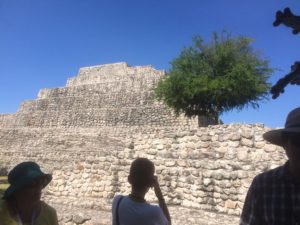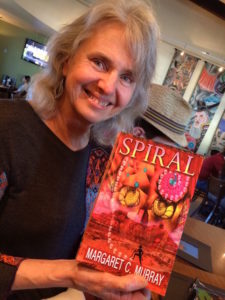Slowly I sit down, looking out from the second story of my present home – a studio in a refurnished barn. Those green trees make me want to meditate. Tonight should be my usual High Trees Meditation at Roshi’s in downtown Sebastopol but I’ll be swimming at Spring Lake instead with my littlest granddaughter and family at her birthday party.
Nowadays my practice mostly consists of putting it off I scold myself. There’s so many thoughts dripping like rain I do not want to have. My big breakthrough at High Trees was last Saturday when I folded my legs, adjusted the two small pillows beneath each knee and leaned back, resting against the wall. Silently I basked in comfort, finally quiet, in the present.
When I called Roshi this morning his wife said he had just returned from a retreat in Canada. I heard her summoning him to the phone.
“Would you be able to include my name with the other meditators tonight?” I asked, explaining I’ve been feeling sickish and won’t be able to attend his meditation session. Even as I speak I feel myself stiffen, retreat.
“Of course,” Roshi says. He sounds sympathetic. “Take care of yourself.”
Give yourself a break I console myself after hanging up. You aren’t lying. You are just not revealing everything. After all your granddaughter counts too.
I could practice meditation right now. Shut all thoughts out. Such a challenge. It was yesterday too I reflect. Yesterday consisted of negotiating a tax bill, moving my money from one account to the other, cooking three one-person meals, emailing my tenants about their back rent in my house in El Cerrito, reviewing my bank account including that request for a loan adjustment, and walking the dogs. Where is there time to concentrate on my practice, whatever that is?
My mind refuses to cooperate, corrupted by even more thoughts. In ten minutes I need to drive to fetch my granddaughters from preschool and middle school.
“Swimming can easily be my meditation practice,” I think as I hurry out the door and down the steps to my car.
Meditation seems impossible by the time I back out of the preschool parking lot. Should I laugh or cry when my four-year-old granddaughter shouts at me from the back seat, yelling she doesn’t want me to come to her birthday party.
“Break my heart, girl!” I mumble laughing, covering the hurt I’m embarrassed to feel.
I turn into the middle school parking lot on the next block, honking as I spy her big sister laughing with her friends.
I drive them home where my daughter waits impatiently. Eleanor asks if I’ll take her to Trader Joe’s before we head to Santa Rosa and pick up Don at work on our way to Spring Lake. She says she needs to do a little more shopping.
We hurry through the supermarket aisles, the girls clamoring at their mother to buy this and that. Shuffling behind them, I realize how I long to have my daughter back to myself as it was when she was a little girl. She and I were together all week as Don was on assignment in LA. I should meditate on longing. What would Roshi say? It’s an opportunity, I guess. I could bring it up to the group next time.
The sun is almost down when I drive everybody home from the lake. “Come on in for a glass of wine, Mom,” Eleanor suggests.
I deserve something after swimming with my birthday girl and her sister all evening
“Okay.”
Sipping wine, I stand over the girls as they fall down in their bunk bed, eyes still sparkling from the party. I used to blow them kisses so they would fall asleep but no doubt they’re beyond that now.
Don offers me another glass of wine back in their living room. I shake my head no. The TV is on. I hear the girls giggling in their bedroom. My daughter goes in to quiet them.
Driving back home I remind myself I wanted all this. Why is it then I feel so–what? Isolated? Not exactly. I rented my house out to come to Sebastopol, move closer to my daughter and her family. I was charmed by the thought of living in a studio above a barn.
Look at the nearly full moon! Here’s hoping its light settles on me too.
“I’m ready to meditate,” I tell the Roshi in my mind.
“Let go,” he says. “Just let go.”
After parking, locking my car doors, I slowly climb the steps to my studio. It’s beginning to rain.
My cat and dogs greet me eagerly. After feeding the animals I sit cross-legged on my rug to begin the first of ten sets of breaths when Izzy jumps up on my lap, purring loudly. She flicks her tail, waving it back and forth in my face. I pet her, forget breathing.
“Let’s go to bed,” I say after a while.
Lying under my blankets, hearing rain on the roof, I feel desperate to slide into oblivion and shut my eyes.
I have been asleep. How long? I refuse to look at the clock on my shelf. I’ve read that checking the time makes sleep even more difficult. I close my eyes.
Wind drives the trees thrashing outside this barn, those huge redwoods along the gravel driveway. The rain seems heavier now.
It’s light when I wake. I had been dreaming though I can’t remember what. Outside my window I hear the “Caw caw caw!” of crows.
“I’m looking for happiness,” I call out to the birds.
“Upaya Paramita” Roshi calls it, the path that honors each stone and plant, each animal and human being, a metaphor for living my one and only life.
My dogs wag their tails, expecting their walk.
“No one’s out in this rain,” I tell them, leaning down to scratch their ears. They aren’t listening.
Now…. now what?
Except for the rain, there’s just space in my tiny studio. Space to meditate, calling up the moment when I no longer remember the thousand and one tasks I normally set myself to do.
I feel dizzy as I stand up. I remember something of my dream. Eleanor was in it, just a tiny girl then, not even three. Is this some unknown, heavy cloud related to last evening’s birthday party? The girls had been so happy, especially my birthday girl. It was me was what? –critical. Of them? No, of myself. Refusing to capitulate but to–what?
It was only a dream.
I walk about my studio, clogs clattering on the hardwood floor disturbing the silence, my left ear pulsing from injuries long ago. I consider the old smudge bowl on my dresser top, the plate beneath it, my binoculars placed nearby at an angle. These objects have history, a solidity and depth. Their seeming randomness is not unintentional but full of possibilities only I would know.
The smudge pot used to hold burning sage, the smoke anointed by our sweat lodge leader to cleanse us before entering, we non-natives and the few Native Americans. Yes, my smudge pot signifies more than just being an object d’art. It holds intentions and dispenses healing.
Suddenly I remember my dream. Little Eleanor and I were walking on Mission Street in San Francisco near where her father and I had just rented a unit in a rundown Victorian house. Eleanor running ahead past small, crowded shops, me behind her pushing the stroller full of groceries.
I watch my daughter in her little pink jacket and corduroy overalls dodge a couple coming towards her.
“Careful!” I call out, laughing, hurrying to catch up. I’m concerned, yes of course, but thrilled too by such sweet happiness my little daughter finds in darting in and out between the shoppers.
I feel peaceful just to follow behind and watch her. I could have done it forever. But, no, she is approaching a crosswalk.
“Eleanor! Wait for Mommy!” I shout.
You turn, looked back at me. I run and take your soft, little hand.
What else happened? I don’t remember. Nothing I guess. But I feel different now somehow. Happy. Hopeful. Looking forward to today. Such a special time long ago when we stood at the corner together waiting for the light to change.
After the animals and I eat breakfast, for me toast, a fried egg and coffee, for them food from a can, I dress warmly in my turtleneck shirt and jeans, survey myself in the mirror. Adjusting my wool vest, I appreciate this moment, my quiet space. Pema says in Starting Where You Are that space is the secret portal of freedom. Not fighting, analyzing, just being present to what it is to be alive is the key. No need to tie oneself up with defensiveness, self-deprecation. That’s real meditation.
But first I need to walk the dogs.
“Izzie! Bandit!” I put on my boots, grab my rain jacket and cell phone.
They wag their tails while I attach their leashes to their collars, pick up my umbrella by the door. We go out onto the soaking wet deck and down to the road empty of traffic at this time of day. I marvel at the tiny apple blossoms on nearby trees.
We turn left, up Thomas Road, the barn behind us now hidden by a forest of thick foliage.
I remember now that Stanton called a few nights ago to say he’s in the area and wants to come by. He needs to talk to someone he says. That means he’ll be here tonight, sleeping in his car. I’ll need to make dinner. I’ll have to go to Organic Foodmart. As usual I’m delighted to host this young man from the sweat lodge. I told him I was routing for his success no matter what he did with his life.
I hear a California Quail. But no, who can mistake the mockingbird? And what is that? A morning dove? Stupid, that’s the owl. Whooo-whoo-whoo, gentle and rhythmic as sleep. I picture it in the high trees to my left.
Listening to birds gives me a sweet feeling, wordless, purposeful, like Pema describing “chenpa”.
I’ve given up listening to her Unconditional Love CD though. Her words suck up everything in the room, stopping my breath. It becomes harder and harder to concentrate. The birds remind me I have to do something, but what? I feel anxious, wanting to hurry, but to where?
In the background the whoo-whoo-whoo of mourning doves on telephone wires diverts me. A crow screeches as it flies by.
The dogs and I hurry on past dripping telephone poles beneath sagging wires, wild-blowing trees and rows and rows of grape arbors. I begin counting my breaths.
Another turn in the road and I’ve forgotten where I am in my numbering.
“I’ll put it off for another time,” I tell the dogs. They wag their tails.
We stop to look for the horses.
“Daisy! Wilder!” I call out from under my umbrella.
I don’t see them.
Walking up this wet, grey asphalt road, I plot our next steps. We’ll turn around soon. The rain is coming down faster.
Two doves on telephone wires struggle to keep their perch. More birds swing crazily high in the sky above the road, swooping down as if to replace them.
Is that a murder of crows following us up the empty winding road? Louder and louder they caw above us circling ahead. When I turn, they follow, flapping wings and screaming.
The dogs and I reach the corner where an empty barn stands near a lone pear tree. My mind wanders. The challenge as Roshi says is to stay in the now.
Two years ago Eleanor and I buried Lula, my fifteen-year-old cat. It happened right after I moved to Sebastopol. Oh, pear tree. Oh, Lulu. Rich Sonoma County soil covers you now, hiding my loss. It seems like yesterday. My heart still clenches. How I loved that cat.
But hey, the dogs and I are taking a walk in the rain now and that’s all that matters, isn’t it? Let’s see what happens I counsel them as we go up a hill. Bandit looks up at me with cream-brown eyes.
Hearing a car behind us, I hurry the dogs to the edge of the road, waiting till it passes by. Rain sounds louder when we were walking in the center of the road I realize. I cannot hear the birds as well now either. ”
It’s too quiet, right. What do you think, Izzy? The road veers right and we go uphill.
There’s the horse pasture circled by a white fence. Inside two dressage horses grazing. My friends. I’m surprised they’re out in the rain. Wilder a rich brown, Daisy light tan. Their owner told me their names.
“Hello, beautiful horses!”
We’ve passed them now, turned a bend, the dogs and me.
My cell phone is buzzing in my pocket. It’s Dawn, a new friend from Sebastopol, her hometown I’ve learned. Dawn asks what I’m doing today. Walking the dogs in the rain as usual I say. Everything is green here I add. Green leaves, green grass, green trees, green grapes on all the vines along our road. Dawn laughs. I hear her country music in the background.
When we arrive back home I see a large black raven strutting across the yard with a thick yellow twig in its mouth. It steps awkwardly from side to side, jerking its neck back and forth with the effort. I am like the raven I think. To be the bird, this is my practice. My meditation.
The raven disappears under the steps. Calm down. What else is there but now?
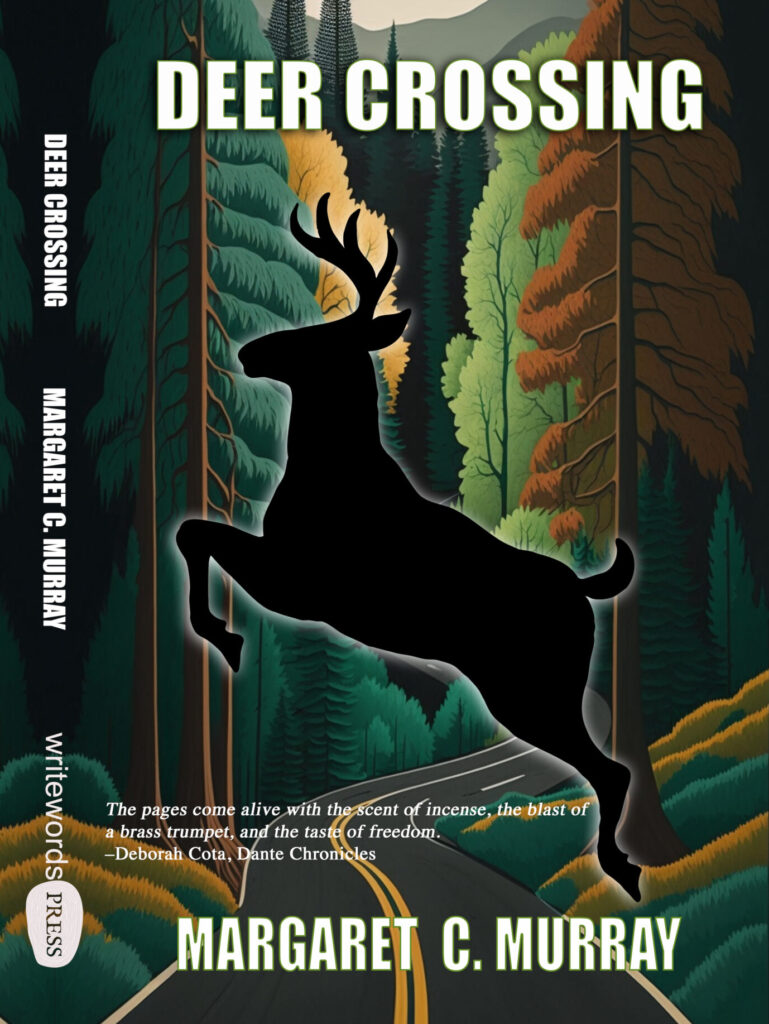

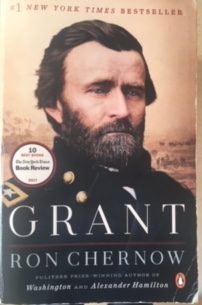
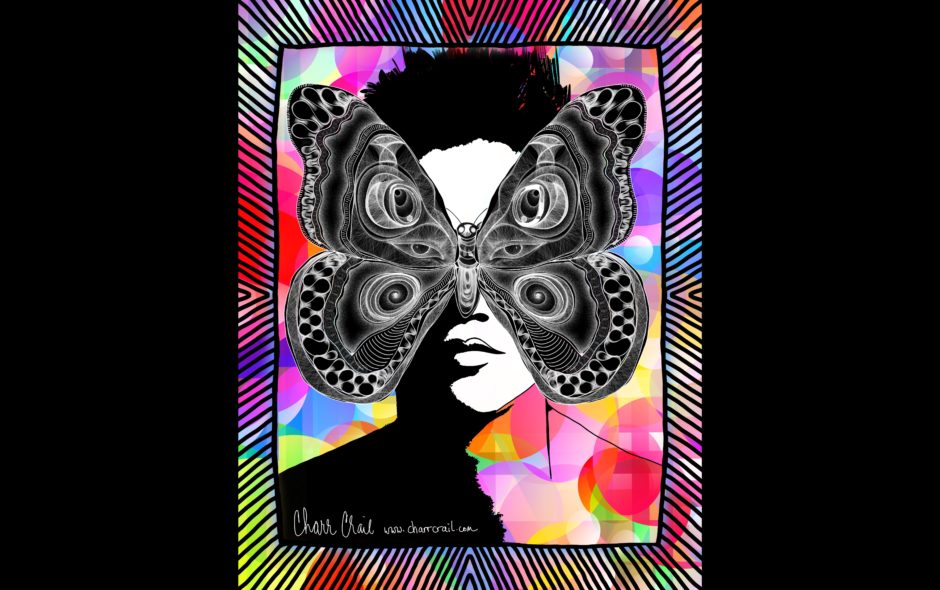
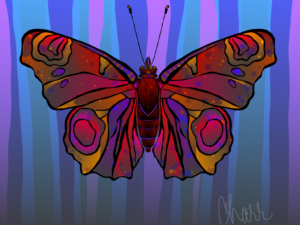
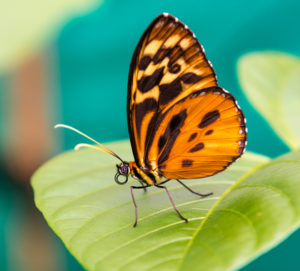
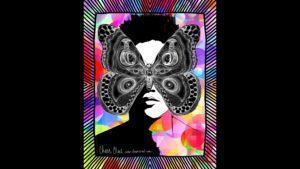
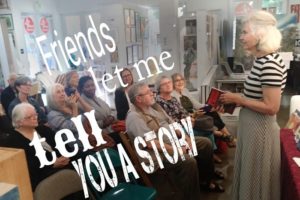
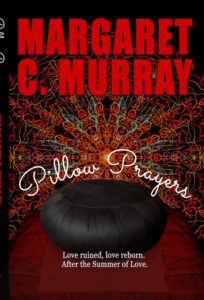
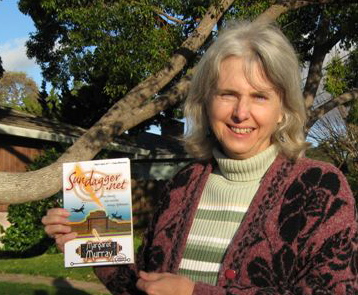
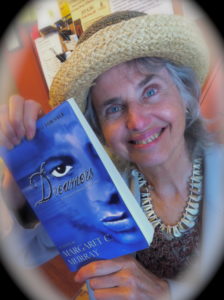
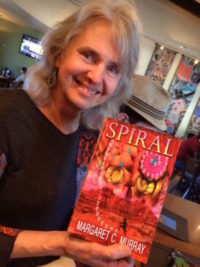
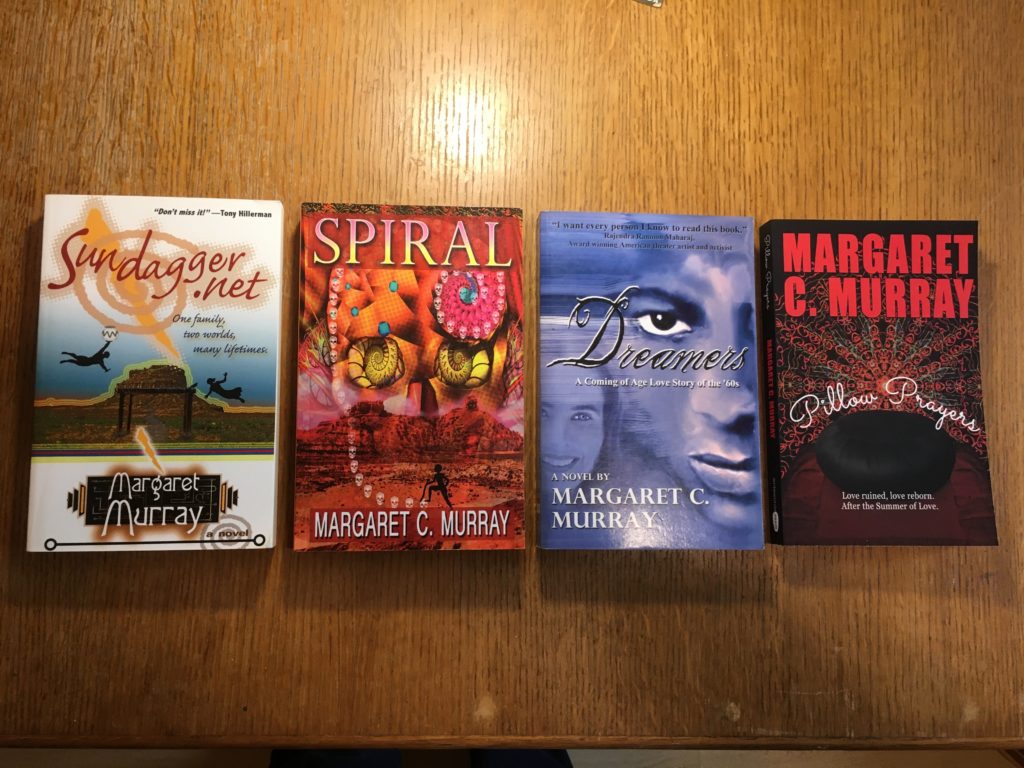
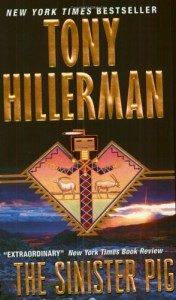 Tony Hillerman, famed mystery writer of the Southwest, wrote the above advice to me the last year before his death in 2008. We had been corresponding since before I published my novel of the ancient Anasazi of the Southwest, Sundagger.net. In a note to him, I had been complaining, whining really, about my writing life.
Tony Hillerman, famed mystery writer of the Southwest, wrote the above advice to me the last year before his death in 2008. We had been corresponding since before I published my novel of the ancient Anasazi of the Southwest, Sundagger.net. In a note to him, I had been complaining, whining really, about my writing life.